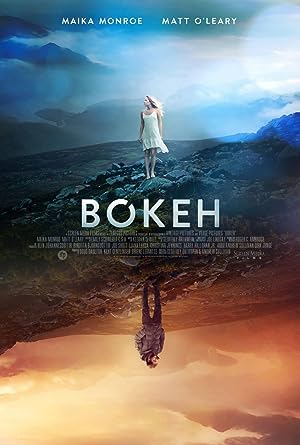Bokeh is about an American couple played by Maika Monroe and Matt O’Leary who visit Iceland then wake up to discover that there are inexplicably no other people on Earth (there are also no bodies). Skip Bokeh and see Die Wand or The Wall instead, which is more depressing, but way better.
Iceland must be a life changing experience that cannot be translated into film because I have now seen two dramas, Bokeh and Land Ho!, that render the filmmaker incapable of making an interesting story in the face of its beauty. Skillful, pretty actors, premise fiction and a beautiful landscape are not sufficient elements for a good story. Understandably the characters spend a lot of time debating about what happened, which is annoying and realistic, but then it evolves into an existential crisis of perspective and devolves into an apologetics impasse.
Bokeh has no momentum and perhaps would have worked better as a short film or a play. Bokeh has value and asks even if a couple loves each other, is that enough or do you need more to live a full life? I like that Bokeh approaches the idea that the Adam and Eve archetype may not be a paradise, but is inherently apocalyptic because of different perspectives, mourning versus adventure. These differing perspectives add nuance to the characters. Bokeh finally and briefly gets interesting when they go to the cabin after one hour (it is a 92 minute film). Bokeh suggests that the silence is an overwhelming way to communicate with God, not a sign of being abandoned or condemned, but even the idea of an unseen main character goes no where. Adam’s cheery outlook hides a quiet desperation and fear of the next world, but that is because of how O’Leary interprets and depicts his character.
Bokeh is a photographic term for something being out of focus in the background. Bokeh ties the apocalyptic event to when Eve (I don’t care to remember the characters’ actual names) witnesses the Northern Lights become brighter than usual and her appearance becomes black and white, which is later echoed near the end of the film when Adam discovers his black and white photograph of her. Since the title of the movie and one of the main characters deals with photography, perhaps Bokeh is not an existential disaster film, but a film that tries to capture an emotional moment in time when one person realizes that she will always be alone and separate as a part of existence and can no longer enjoy life. Her image was captured at that point of disaster then the remainder of the film chronicles her transformation from a three dimensional representation projected onto a two-dimensional surface into a two dimensional memorial object. Bokeh portrays the artistic or creative personal relationship apocalypse caused by existential despair. Or maybe I’m trying to find meaning in a boring film.
On a practical note, I’m annoyed that Bokeh did not come with any subtitles. I may not be a hearing impaired viewer, but especially when a film is set in another country, I use subtitles to make sure that I understand what everyone is saying and nothing gets lost in translation because of accents.
I didn’t enjoy watching Bokeh. Bokeh seemed simultaneously too pretentious and prosaic to feel authentic emotion. Bokeh had many strong elements, but ultimately lacked focus.
Stay In The Know
Join my mailing list to get updates about recent reviews, upcoming speaking engagements, and film news.





